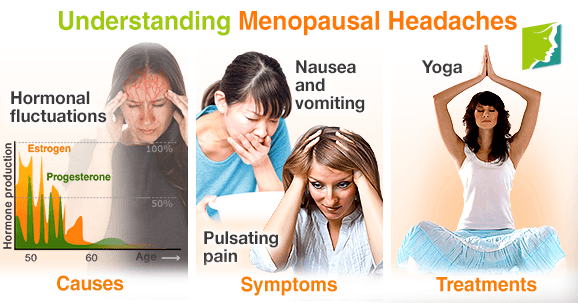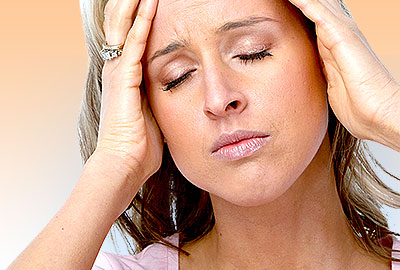Did you know?
According to the Women's Health Initiative, migraine pain and symptoms affect 29.5 million Americans.
It has been shown that women experience migraine headaches five times more regularly than men. This is most likely due to the hormonal changes women experience during menstruation, pregnancy, and menopause. Women are more susceptible to frequent and intense headaches as they approach menopause because of the hormonal imbalances that the transition causes.
Migraines are generally described as a recurrent, throbbing pain that starts on one side of the head and lasts anywhere between a few hours to a few days. Keep reading to learn more about common causes, symptoms, and ways to treat these painful headaches.
Causes
Hormonal imbalance is the primary cause of menopausal headaches.Essentially, the hormone estrogen causes blood vessels to dilate, while progesterone makes them constrict. When hormones fluctuate, it results in intense pain because the vessels are constantly expanding and contracting. Other triggers that induce headaches during menopause are:
- Bright lights
- Loud noises
- Strong odors
- Stress
- Anxiety
- Alcohol
- Caffeine
- Lack of sleep
- Monosodium glutamate (MSG), often found in fast food
These triggers should be avoided as much as possible. Every woman is different, and some are more susceptible to headaches than others, but it is still recommended to steer clear of these common triggers.
Symptoms
There are two types of hormone related headaches: the first is caused by declining estrogen levels, and the second by elevated estrogen levels. Common symptoms of menopausal headaches include throbbing, pulsating pain that can range from mild to severe and sensitivity to light, sound, or strong odors. Intensification of pain by routine physical activity, as well as nausea and vomiting, can also result in severe migraines. These menopausal headaches can be debilitating for some women, although their severity varies from person to person based on hormone levels and genetics.
Treatments
There are several effective ways to treat menopausal headaches. Making a few simple lifestyle changes, like getting plenty of sleep every night and eating healthy meals and frequent snacks to keep blood sugar levels high will help prevent menopausal headaches. Also, try to avoid triggers like alcohol and caffeine, get plenty of exercise, and try to reduce stress. Yoga is a great activity to reduce stress and is a low-impact workout. Swimming, cycling, and walking are also great ways to get some daily aerobic activity.
If none of these techniques help prevent or reduce the frequency of these headaches, try taking over the counter medicine like aspirin, ibuprofen, or acetaminophen. These drugs help stop migraines in progress, and are referred to as “acute treatment”. If these over the counter medications are not strong enough, talk to your doctor about the possibility of a permanent preventive prescription.
Although menopausal headaches are not easily avoided, they can be treated and prevented by making a few simple lifestyle changes or taking medications. Symptoms can vary from person to person, so choose the treatment option relative to your pain level. It is recommended to see a doctor if headache symptoms get worse or do not subside after several days.
Sources
- National Health Service UK. (2013). Hormones Headaches. Retrieved July 15, 2014 from http://www.nhs.uk/livewell/headaches/pages/hormonalheadaches.aspx
- Office on Woman's Health. (2012). Migraine Fact Sheet. Retrieved July 15, 2014 from http://www.womenshealth.gov/publications/our-publications/fact-sheet/migraine.html#n




